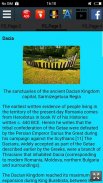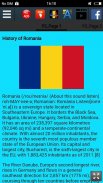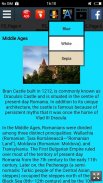








Romania History

Description of Romania History
Romania (/roʊˈmeɪniə/ (About this sound listen) roh-MAY-nee-ə; Romanian: România Listeni[romɨˈni.a]) is a sovereign state located in Southeastern Europe. It borders the Black Sea, Bulgaria, Ukraine, Hungary, Serbia, and Moldova. It has an area of 238,397 square kilometres (92,046 sq mi) and a temperate-continental climate. With almost 20 million inhabitants, the country is the seventh most populous member state of the European Union. Its capital and largest city, Bucharest, is the sixth-largest city in the EU, with 1,883,425 inhabitants as of 2011.[8]
The River Danube, Europe's second-longest river, rises in Germany and flows in a general southeast direction for 2,857 km (1775 mi), coursing through ten countries before emptying into Romania's Danube Delta. The Carpathian Mountains, which cross Romania from the north to the southwest, include Moldoveanu, at 2,544 m (8,346 ft).[9]
Modern Romania was formed in 1859 through a personal union of the Danubian Principalities of Moldavia and Wallachia. The new state, officially named Romania since 1866, gained independence from the Ottoman Empire in 1877. At the end of World War I, Transylvania, Bukovina and Bessarabia united with the sovereign Kingdom of Romania. During World War II, Romania was an ally of Nazi Germany against the Soviet Union, fighting side by side with the Wehrmacht until 1944, when it joined the Allied powers and faced occupation by the Red Army forces. Romania lost several territories, of which Northern Transylvania was regained after the war. Following the war, Romania became a socialist republic and member of the Warsaw Pact. After the 1989 Revolution, Romania began a transition towards democracy and a capitalist market economy.
Following rapid economic growth in the early 2000s, Romania has an economy predominantly based on services, and is a producer and net exporter of machines and electric energy, featuring companies like Automobile Dacia and OMV Petrom. It has been a member of NATO since 2004, and part of the European Union since 2007. A strong majority of the population identify themselves as Eastern Orthodox Christians and are native speakers of Romanian, a Romance language. The cultural history of Romania is often referred to when dealing with influential artists, musicians, inventors and sportspeople.

























